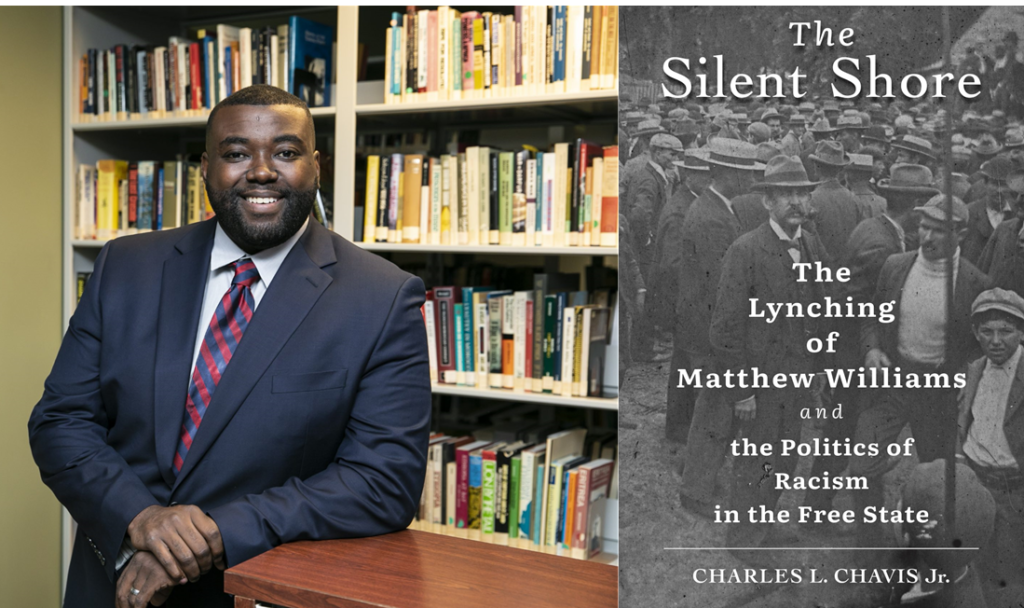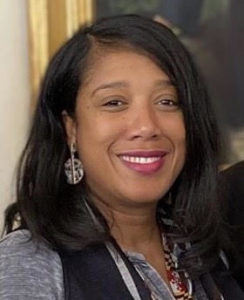
In partnership with the Virginia Center for the Book at Virginia Humanities, the Maryland Center for the Book at Maryland Humanities presents Charles L. Chavis, Jr. (The Silent Shore: The Lynching of Matthew Williams and the Politics of Racism in the Free State) as he shares a more complete narrative of a human life taken by lynching in Salisbury, Md., in 1931. Chavis worked from previously undiscovered documents to reconstruct the full story of one of the last lynchings in Maryland, including the politically-driven aftermath which led to the state’s Interracial Commission, a pioneering force in the early civil rights movement.
This virtual event on February 3, 2022 at 12:00 p.m. is FREE to attend and open to the public. To attend, please register below to take part on Zoom or simply make plans to watch the livestream on Facebook.com/VaBookFest.
This event will offer closed captions and an accompanying live transcript using Zoom’s built-in automatic speech recognition software (ASR). To request live-captioning accommodations, please write vabook@virginia.edu no later than seven days before the event. A video recording from this event will be provided soon after completion and an accurate transcript will be available at a later date, at VaBook.org/watch.
The Silent Shore is a must-read account of the 1931 lynching of a young Black man on a December evening in downtown Salisbury, Maryland… Chavis digs deep, finding documents never before seen publicly, to present a rich and revealing story of how lynchings were planned and executed, and of the conspiracy of silence among white people in the region that shrouded the perpetrators of lynching from accountability. The story resonates with power and caution for our contemporary efforts to address racial violence and discrimination.
—Sherrilyn Ifill, president/director-counsel, NAACP Legal Defense and Educational Fund, Inc., author of On The Courthouse Lawn: Confronting the Legacy of Lynching in the Twenty-First Century
Buy a copy of The Silent Shore from our official bookseller.
- About the Author
Charles Chavis, Jr., Ph.D is the Founding Director of the John Mitchell, Jr. Program for History, Justice, and Race at George Mason University’s Jimmy and Rosalynn Carter School for Peace and Conflict Resolution, where he is also an Assistant Professor of Conflict Analysis and Resolution and History.
Dr. Chavis is a historian and museum educator whose work focuses on the history of racial violence and civil rights activism and Black and Jewish relations in the American South, and the ways in which the historical understandings of racial violence and civil rights activism can inform current and future approaches to peacebuilding and conflict resolution throughout the world.
He is editor of For the Sake of Peace: Africana Perspectives on Racism, Justice, and Peace in America (Rowman & Littlefield, 2020). His latest book, The Silent Shore: The Lynching of Matthew Williams and the Politics of Racism in the Free State (Johns Hopkins University Press, 2020) was released in January 2022.
- About the Moderator- Maya Davis
 Maya Davis is the Director of the Riversdale House Museum, the former 19th Century Plantation home of George and Rosalie Calvert, as well as generations of enslaved families held in bondage. Prior to her arrival at Riversdale, Maya was the Research Archivist and Legislative Liaison at the Maryland State Archive where she (1) consulted on statewide projects that documented, interpreted and preserved African American History and Culture and (2) facilitated discussions on state legislation and contemplated legislation. Some of her legacy projects include the installation of the Frederick Douglass and Harriet Tubman Statue at the Maryland State House, the Annapolis Port Marker project to commemorate the landing of African slaves who survived the Middle Passage, and the Harriet Tubman Underground Railroad National Park and Visitor Center. Maya currently serves as a Commissioner on the Maryland Lynching Truth and Reconciliation Commission and the Maryland Commission on African American History and Culture and is a board member of the Prince George’s County Historical Society. Previously she served as the Interim Director of the Banneker-Douglass Museum and the Maryland Commission on African American History and Culture, staff at the City Museum of Washington, DC, and Vice Chair of the Annapolis 1864 Commission to Commemorate the Emancipation of Slavery in Maryland. A native Washingtonian, Maya is a graduate of Howard and George Washington Universities where she obtained degrees in History and Museum Studies.
Maya Davis is the Director of the Riversdale House Museum, the former 19th Century Plantation home of George and Rosalie Calvert, as well as generations of enslaved families held in bondage. Prior to her arrival at Riversdale, Maya was the Research Archivist and Legislative Liaison at the Maryland State Archive where she (1) consulted on statewide projects that documented, interpreted and preserved African American History and Culture and (2) facilitated discussions on state legislation and contemplated legislation. Some of her legacy projects include the installation of the Frederick Douglass and Harriet Tubman Statue at the Maryland State House, the Annapolis Port Marker project to commemorate the landing of African slaves who survived the Middle Passage, and the Harriet Tubman Underground Railroad National Park and Visitor Center. Maya currently serves as a Commissioner on the Maryland Lynching Truth and Reconciliation Commission and the Maryland Commission on African American History and Culture and is a board member of the Prince George’s County Historical Society. Previously she served as the Interim Director of the Banneker-Douglass Museum and the Maryland Commission on African American History and Culture, staff at the City Museum of Washington, DC, and Vice Chair of the Annapolis 1864 Commission to Commemorate the Emancipation of Slavery in Maryland. A native Washingtonian, Maya is a graduate of Howard and George Washington Universities where she obtained degrees in History and Museum Studies.
Both Centers for the Book are affiliated with the Center for the Book at the Library of Congress. To learn more about their work visit Maryland Center for the Book and Virginia Center for the Book.
To learn more about the work of state humanities councils, visit: Maryland Humanities and Virginia Humanities.

